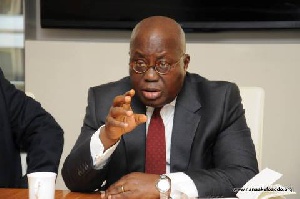THE political campaign season is heating up. Pledges and promises are starting to come in thick and fast. One of those is by the New Patriotic Party. Its flag bearer has promised to set up a factory in each district, if voted into power.
Noble as the intention of this proposal may be, the plausibility of it is unproven. As we interrogate the issue, it throws up questions to which answers are either non-existent in reality or scarce from the proponent(s).
The Centre for Evidence Based Discourse presents a few questions with which the public can better interrogate the proposition and attempt to make sense, if any, of it.
Our first question is spatial. The one factory per district exposes what it does not say than what it says. Assuming that party 'A' ascends the reigns of power and manages to establish 275 factories in Accra. If that happens, the policy of one factory per district could have been deemed to have been mathematically realised.
To put that question in better perspective what if all the 275 factories are established in the Greater Accra region? How about if those factories are set up only in the south; or only the North? The question is, do they mean one factory per district which would me establishing 275 factories regardless of where and striking 275 over 275, or one factory located in each district?
Our second question results from the pronouncements of the leader and running mate of the New Patriotic Party. Some of these immediately threaten the feasibility of the factory agenda. One of such policy proposals is that tarrifs on imports would be removed if the NPP wins power. This proposal immediately throws up fiscal challenges.
A cut in or removal of tariffs means that the government revenues would constrict. How would this revenue gap be resolved? No statement has been made to resolve this question. The nearest attempt, by Dr Bawumia, was that if more factories and businesses are established, they would yield more revenues for development.
True though as it is, it is not possible to halt government’s financial responsibilities and wait for factories to develop through their long lead time until they operate for government to earn taxes. While the factories are being set up and government is starved of tariffs, how would the new factories be funded; and how would the gaps caused by tariff cuts be plucked?
The easiest and immediate means of resolving the first gap (funding the factory projects) is to increase taxes. However the NPP has on many occasions critised the current government for burdening Ghanaians with too many and too much taxes. This presupposes that taxes would also be reduced if not removed. So where would the funds come from? It must be noted that even if private sector funds are sourced, there would necessarily be costs to government.
Our next question is the import influx challenge. A removal of import tariffs would also mean that imports would be cheaper. Nothing would encourage dumping more than a removal of import tariffs. That in itself makes our local factories uncompetitive, if the latter are operational at all.
Infant industries always require protection. But in this case the NPP proposes the very opposite of this proven route. How would they sustain our infant industries in the face of high imports of cheaper products from tested and more efficient foreign ones?
Our final question, which does not by any means exhaust the issues thrown up by this proposition, is, how would this policy deal with districts and metropolitan areas which have heavy investments in factories? Tema, Accra and Kumasi have districts which host large numbers of factories. Would they also attract additional factories?
We at the CEBD believe that if the NPP is to be taken seriously it must find time to deal with the above questions. So far on the basis of the many questions thrown up by their proposals which do not build our confidence in their capacity to manage the country's economy, we cannot vouch for their readiness to be worthy substitutes for the current government.
We expect better, so as to ensure that the ordinary Ghanaian is given the opportunity to decide at the polls whether to stay with the NDC government into the next term of engage in an uncertain change.
© Centre for Evidence Based Discourse, Ghana.
Opinions of Thursday, 29 September 2016
Columnist: CEBD















